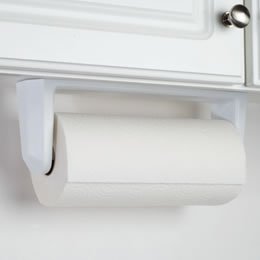I just got back from our company cafeteria. There are the usual things there including a holder for rolls of paper towels. Lately, the rolls haven't been fitting very well into one of the holders. Either the rolls are getting narrower or the holder has been bent so that it is wider (this would be tricky because the holder is made of plastic). Either way, when you put a roll of paper towels in it, the roll tends to fall through. To make it more exciting (a real adventure for this blog??), the garbage can is directly below it. So, the stakes are high! If the paper towel roll falls, you don't want to use it again.

Someone took a stab at making things better and, using a bit of real world engineering, cut a piece of plastic tube that was wide enough to fit between the arms of the holder to hold the roll up. The problem with this design happened as soon as someone (me) tried to change the paper. I didn't know that the "fix was in", so to speak, and the plastic tube dropped into the garbage. I was able to retrieve it and clean it off and, since it doesn't touch the paper, put it back. I didn't know who had fixed the holder but offered my thanks in my heart.
Just today, though, I noticed the paper towel dispenser was empty. Apparently, someone had changed the roll, the plastic tube "insert" had fallen out into the garbage and this person just let it go. I didn't see the tube anywhere nearby and wasn't about to go fishing for it in the garbage. So, I hoped that maybe the problem had been that the paper towels had just been a bad lot and that a new roll of towels would be wide enough to fit correctly. No such luck. So now it was up to me. I tried bending the plastic arms so that they were closer together but unlike metal the plastic arms did not hold their new shape. So I was faced with an engineering problem.
In the end, I tore off some sheets of the new roll of paper towels and folded them over to make them thicker and shoved them between the ends of the holder and the wall. The flexible plastic arms now pointed in a little more than they did before. I tried the new roll of towels but it still wasn't held tightly enough. So, I folded the paper over a few more times. Still no good. I kept trying until the roll of paper towels was held tightly (but not TOO tightly). We'll see how well (and how long) this fix works.
But to me this is the essence of engineering and we all do it often. We are, after all, defined by anthropologists as "The Tool Making Animal". The WAS the definition of our species until some scientists discovered that chimpanzees also made tools (many other species have been found to make tools since). So, the anthropologists had to change the definition to define us as "The Animals That Use Tools to Make Other Tools." It was either that or invite the chimps to send a representative to the UN.
To get back to my point - an engineer looks at a problem, tries to break it down into its components, attempts to quantize it as much as possible and then makes an educated guess at something that will work and tries it. If it works, he rejoices, has a piece of pizza and writes it up in his notebook. If it doesn't work, he analyzes the failure and either tries a different solution or modifies the original attempt. This gets tested. This is what engineers do all day. Try and test. Try and test. An engineering education is essentially learning how to analyze problems, come up with possible solutions and analyze the failures. This last one is important because there are always failures. Even the final answer has to have a failure mode somewhere. But that has to be analyzed and documented somewhere. For instance, you can only use a battery in a certain temperature range. Or a water-proof watch will only work down to a certain depth of water.
It's an exciting and exacting profession. You can spend a lifetime learning about it and getting to be better at it. You never get a perfect answer but you can usually get most things to work well enough for all practical circumstances.


No comments:
Post a Comment